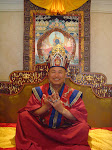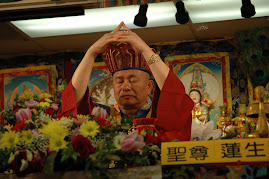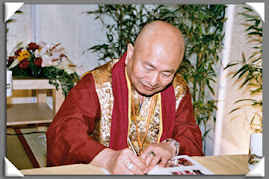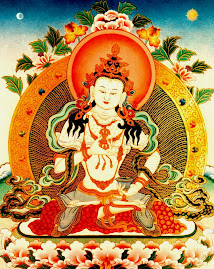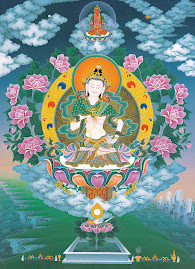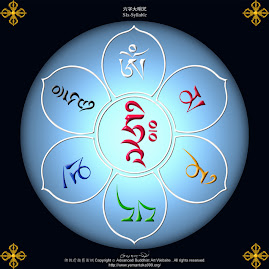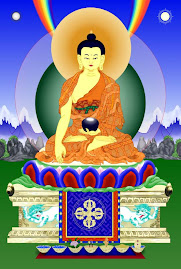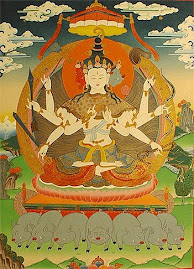Dharma Talk by Living Buddha Lian Sheng on 25/07/96
(Page 177-181)
I talked about why Sakyamuni Buddha was ordained as a monk the other day. I have something to add today.
After some research, I have concluded that there is a strong relation between Buddha's ordination and the western philosophy of "existentialism".
The term "existentialism" is used to describe the philosophical doctrines enunciated by Kirkegaard and Sartre.
As a prince, Sakyamuni Buddha was destined to inherit the throne. He was rich and had a perfect marriage. He had a beautiful wife and a son. Why then did he seek ordination?
"Existentialism" refers to an invisible empty feeling for those who are rich and famous. Leading perfect lives, many will have deep concerns for their own existence, as they feel they are leading lives devoid of meaning. Falling into abysses, they are unable to break free. They are deeply troubled by "emptiness of existence"
There were many instances of rich and famous people who had " perfect lives", yet ended by taking their own lives.
Why did Nobel Prize recipients Hemingway and Kawabata Yasunari, and
Once perfection was attained, there was no more pressure, and they had to face the "emptiness of existence".
In this crucial stage of life, it is very important that we have to use the influence of religion to uplift our mind, then we may survive. Otherwise "emptiness of existence" will set in and swallow us alive.
"Emptiness of existence" lies between life and death; and it is a morbid state of mind.
We must use the power of religion to save its victims. In the context of Tantrayana, they must be encouraged to do spiritual cultivation, so that their mind can be uplifted to a higher level - such as heaven realm.
Sakyamuni Buddha was leading a perfect life, why did he choose to be ordained?
We have to understand the Chinese saying of "Its very cold at the peak." At the apex, you have nothing to conquer; hence you will feel a sense of loss. To you, the value of life is overwhelmed by "emptiness of existence"; and your mind will start to descend. The best way at this juncture is to mobilize the power of religion to uplift your mind to a higher plateau.
I met someone in
Many psychology doctors have embarked on research on this sickness. A Japanese writer wrote: "Literature is a sign of frustration!" Why do writers write in the first place? Because they feel frustrated. In order to vent their feeling, to fill their emptiness, they continue writing. They can't stop, they must vent their frustration through writing.
Once you reach the peak, you will feel the loneliness at the top. I believe many princes who followed Sakyamuni Buddha's footstep to ordination were greatly influenced by "emptiness of existence" - an interplay of existentialism. In fact, during Sakyamuni Buddha's era, eight princes had abdicated their future thrones and were ordained. Why? Rich and famous, and leading perfect lives, they wanted to find out the value of their existence, so that their minds can transcend. They wanted to lead meaningful lives.
Nowadays, many of my disciples sought ordination. I believe they did it for the sake of finding the value of existence. Once achieved, their minds can transcend this world.
That's all for today.
ORDINATION-THE RIGHT VIEW
(INCORPORATING THE COMMENT ON INCIDENT OCCURRED AT ZHONG TAI ZEN TEMPLE)
By Living Buddha Lian Sheng
(page 1, True Buddha News,116 issue, October 15-31,1996)
Translated by Yuan Zheng Tang
The first person ordained to be a monk in Buddhism was none other than Sakyamuni Buddha. He was then a prince, a husband (his wife was Yasodhara),and a father (his son was Rahula). One night he rode a snow white horse and left his palace.
During ordination, he made four great vows, (see Pu Yue Sutra):
1.Helping sentient beings who are in trouble.
2.Eradicating sentient beings' karmic hindrance.
3. Correcting sentient beings' wrong views.
4. Succoring sentient beings from the wheel of sufferings.
Ordination means leading the secular and renouncing the mundane . In my view, when Sakyamuni took this course, he was thinking of using spiritual attainment to fulfill his earthly vow of succoring sentient beings. "It is the twin objects of enlightening oneself and succoring others." This is the greatest undertaking in the world. It is a praiseworthy effort, walking on this path.
When Sakyamuni Buddha became a monk, his father was definitely unhappy, so was his wife. But luckily, his father did not use force to bring him back to palace. And we are not sure whether his wife shed tears and uttered cries of anguish over this issue.
In fact, his father King Suddhodana was not happy. He did send two officers and soldiers to go after him. But they yielded to his determination. In fact, five of them from the army were selected to be ordained, so that the prince had companions.
I believe this was the remote cause of group ordination at Zhong Tai Zhan Si (
The group ordination caused a furor, and parents coming to the temple to look for their children is just a natural phenomena .
The following happened during Buddha's era:
King Suddhodana sent his soldiers and officers to go after him.
His Auntie (step mother - Manaprajapati) wept her heart out.
His wife Yasodhara , tears flowed down like ripples, full of hatred.....
What is the difference between these two events ? There is a great difference in thought between the ordained (aloof from worldly affairs) and the non-ordained (mundane affairs). It is very difficult to reach a mutual understanding, especially when their views are poles' apart, so the communication gap is hard to bridge. If consent and understanding must be obtained, then I am afraid, no ordination will be forthcoming. That is why , I believe, Wei Jue the elderly monk, had chosen to "shave them bald first" . He never expected that by so doing he had stirred up the hornet's nest.
In my view, it is okay to renounce the world, but you must have the karmic affinity to be ordained. Those without , should not force themselves to do so. A few hundred disciples have followed my foot-steps to renounce the world and be ordained. So far, we have not met such problem !
Let me quote two verses from Vimalakirti-nirdesa Sutra as food for thought:
"If I listen to the speech of Buddha, and my parents do not, I should not be ordained."
"Vimalakirti said : "Once you have made the vow to be enlightened, you are considered ordained.""
Ponder over these quotations. There is no point arguing. As Buddhists, if you have the karmic affinity to be ordained , do so by all means. Otherwise let your mind be ordained!









